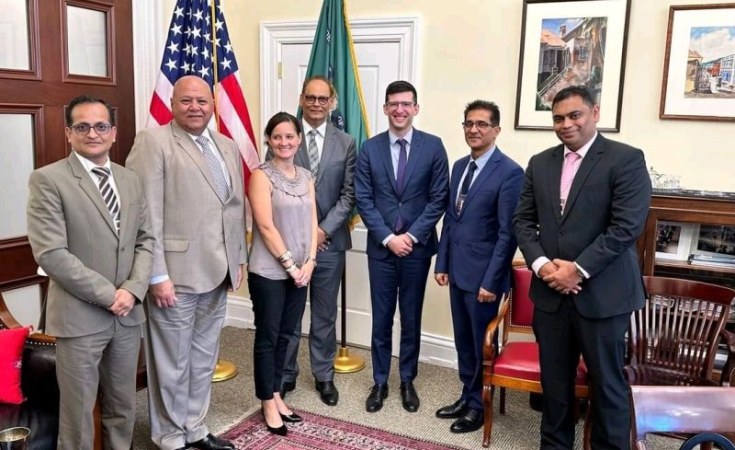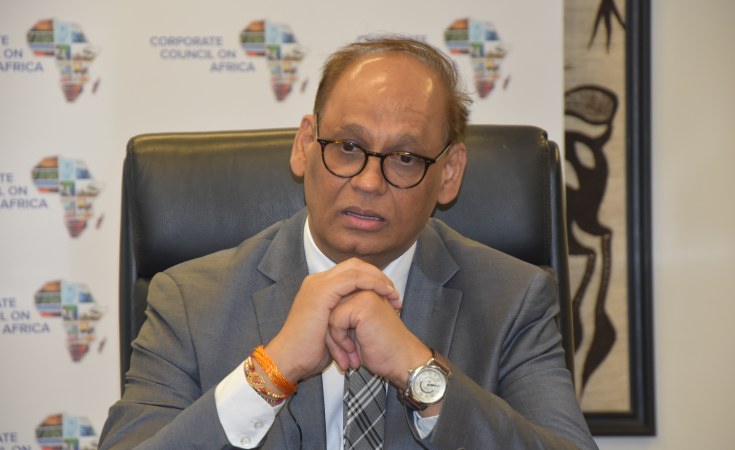Washington, DC — Mauritius, the Indian Ocean island-nation located off the southeast coast of continental Africa - known for powder-white beaches and luxury tourist attractions - has one of Africa's strongest economies. The World Bank ranks the country of 1.2 million people, with a Gross Domestic Product (GDP) of nearly $13 billion, as upper-middle-income. Per capita GDP per capita is about $10,000. After a 14.6% decline in 2020 due to the impact of Covid, the IMF projects Mauritius' real GDP to grow 4.6 percent this year.
On a visit to Washington, DC and New York City, a Mauritian delegation is promoting investment opportunities, publicizing the government's commitment to transparency and good governance, and citing the ease of doing business in the country. Mauritius's active participation in the Africa Continental Free Trade Area (AfCFTA) is one of the assets the team is stressing.
Leading the delegation is Minister of Financial Services and Good Governance Mahen Kumar Seeruttun. The traveling party includes Permanent Secretary Sarwansingh Purmessur; Dhanesswarnath Thakoor, CEO of the Financial Services Commission; Vinay Guddye, Director of Financial Services and Maheshwar Oodit, Manager of Financial Services at the Economic Development Board; Samade Jhummun from Mauritius Finance; Shahed Hoolash, Managing Director of the corporate services firm Vistra; and the Mauritius ambassador to the United States, Purmanund Jhugroo. The delegation also had meetings at the Congress, Securities and Exchange Commission, U.S. Treasury and U.S. Chamber of Commerce in Washington, DC , and participated in the Finnovate Fall event in New York, where the Minister discussed fintech initiatives in Mauritius.
Mauritius has been designated in the most recent reports on tax transparency from the OECD as fully 'compliant' in international tax standards implementation – the only country in Africa to earn that rating. In 2022, the Financial Action Task Force - the international agency that monitors worldwide efforts to tackle money laundering and terrorist financing - determined that Mauritius had been removed from the grey list, having addressed previous deficiencies in technical compliance and implemented all 40 recommendations on the FATF list. On governance, Mauritius is consistently ranked number one in Africa by the Mo Ibrahim Index, which measures security, human development, participation and inclusion, and economic opportunity.
Minister Seeruttun discussed these factors in a briefing last week for members at the Corporate Council on Africa in Washington DC. He also promoted the upcoming Africa Partnership Conferencethat Mauritius is hosting in early October. Following the CCA session, Minister Seeruttun spoke with AllAfrica and provided an overview of opportunities Mauritius offers investors and operating companies. He outlined his government's commitment to transparency and ease of doing business. The interview video can be viewed here.
What Mauritius has to offer investors
Mauritius has a track record of almost 80 years of attracting investments, including cross border investment. Today, I can say that we have developed Mauritius as a robust and trustworthy international financial center. We have legislation to make it well-regulated, transparent and trustworthy. We have introduced a number of innovative products which are very competitive and cost efficient. We have a pool of talent. We have double-taxation treaties with over 45 countries. We have IPAs - industry, promotion and protection agreements - with a number of countries.

Mauritius has a very open economy - there is no restriction on capital flows. Mauritius having been at one time a French colony and also a British colony, our legal system is unique - practicing both English common law and the French Code Civil. We speak both French and English. We have a very solid banking system, and we are fully democratic. We offer full security, because there is no restriction on capital flows.
Trustworthy, transparent and collaborative, with an open economy and no restriction on capital flows
We have the African Continental Free Trade Agreement (AfCFTA), and we have a free trade agreement with China, with India, and with the UK and EU. So all in all, this opens up the world to us. You can travel to South Africa in four hours. You can be in Kenya in four and a half hours. We have daily flights to Europe. We have daily flights to India and also to Australia. So I think we have the ecosystem in place today for investors to feel free, safe and secure.
How Mauritius is regarded internationally
Mauritius is very intent on compliance with international standards on tax matters.
OECD is the international agency that sets global tax standards [editor: designed, for example, for information sharing to reduce illicit financial flows and tax evasion between and among countries]. We have been adhering to those. We carry out peer-to-peer reviews regularly, and - according to the last review that was conducted – we didn't practice any harmful tax regime. So we are whitelisted completely when it comes to those standards.
Also, we are completely on the whitelist of the European Union. To be able to adhere to those conditions, we had to come up with new pieces of legislation, which we have introduced in our legal framework. And, of course, we always keep abreast of what are the changes. And wherever there is a need to amend our legislation, we do it so we keep on maintaining that level of compliance.
We regularly have meetings with the OECD people under the global forum for tax matters. We have committed ourselves to share information as far as possible. This is one thing that investors look for when they're considering where to set up their business activities. Reputation is something that we are very much committed to keeping – as a trustworthy, transparent and very collaborative jurisdiction.
We are a member of the IOSCO, which is the International Organization of Securities Commissions. We have MOUs (Memoranda of Understanding) with a number of jurisdictions where we can share information. That gives comfort to anyone looking at Mauritius.
Likewise, Mauritius has been very concerned about maintaining the level of compliance to AML CFT (Anti-Money Laundering / Countering the Financing of Terrorism) standards. AML CFT compliance is set by the Financial Action Task Force. We are among the very few countries that have fully complied with all 40 recommendations set by the Task Force. It gives us comfort that we maintain that level of compliance. We are very much committed to ensureing that we don't compromise when it comes to complying with those standards that are set by international agencies.
Is Mauritius a tax haven?
We are not a tax haven. We adhere to all the requirements set by the OECD. We are on the whitelist of the OECD when it comes to tax matters because we don't practice any harmful tax regime.
Mauritius is not a tax haven. It is fully compliant with international standards. No 'shell companies' are permitted

We are fully compliant with the OECD standards. Any licensee operating in Mauritius has to have officers [and] local directors and show that activities are being carried out. No shell companies are allowed to operate in Mauritius. They won't be licensed.
Ease of doing business
We have put a lot of efforts and resources to ensure whoever is looking at Mauritius is being given the right treatment and that applications are being processed in a very seamless way. When you look at the World Bank report on ease of doing business, we are ranked 13th in the world. We have improved, [and] we keep on improving.
The Economic Development Board, which is the investment promotion arm of the government, have in place a process where they 'handhold' investors to ensure things are done rapidly and efficiently. The Financial Services Commission (FSC) regulates the non-banking financial services sector. There, too, we have a specialized desk, where whoever is applying for a license would meet the right people. They won't have to go from one office to the other or from one department to the other. They will have all the information that they require and will be able to submit the applications – and those will be treated in a very efficient way. Within weeks, a license can be processed and delivered, if all the documents are completed and submitted. At the level of the government – as policymakers – we try to be as flexible as possible, to make sure that people feel welcome when they want to look at Mauritius as a place to do business.
We have come up with a number of incentives, as well, to attract investors. We hope that in the very near future, we can be in the top 10 when it comes to ease of doing business.
Promotion of Good Governance
My ministry – it's a ministry of financial services and good governance – was set up in 2014. And ever since, my ministry's mandate is to ensure that best practices, good practices are being adhered to. We carry out a number of awareness, sensitization bids for the public sector or the private sector. And we carry out training to make people more aware of the sense of adhering to ethical practices and good practices. We have the office of public governance, public-sector governance, which ensure that all the public entities are adhering to those good practices.
And for the private sector, in my ministry we have a National Committee on Corporate Governance to ensure that the corporate sector, the private sector, are coming up with new frameworks within their organization to adhere to those best practices. In fact, we introduced a scorecard system, inviting corporations to be reviewed and to see how they are adopting those best practices. Of course, this is also a marketing tool for them as you know, if they can demonstrate that they are good employers.
We are also contemplating a review of our Code of Practice - a code of good governance. We introduced the first one in the early 2000s. The second one was reviewed in 2016. And now, we are working again, with the support of the OECD, to adhere to the G-20 principles of good governance. We hope that new code will be out very soon, once we get everyone to agree.
If we want to attract investors, we have to have the right ecosystem in place where transparency, accountability, good practices are something that we really want to promote.
Interviews published on AllAfrica are edited for clarity, flow and length.


